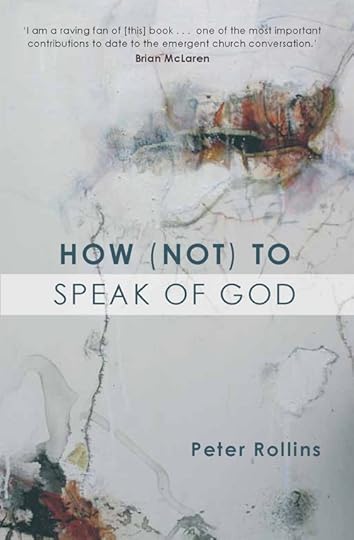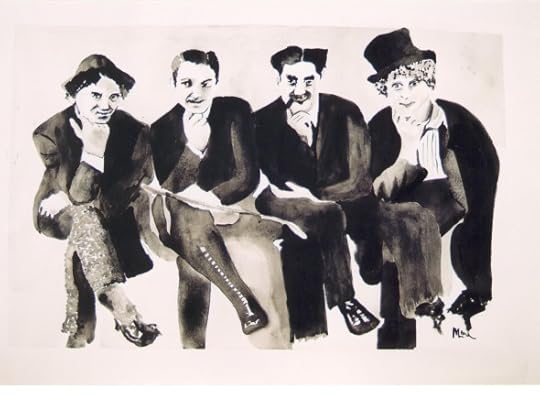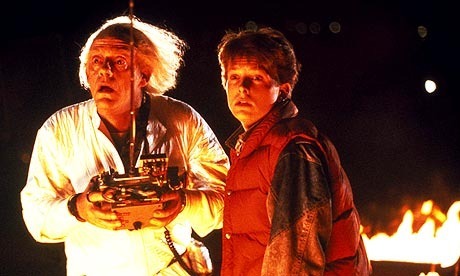Peter Rollins's Blog, page 53
July 14, 2011
July 12, 2011
OP11, Nashville
The Outlaw Preachers strive to create spaces which they describe are for "messy, broken, wounded, untrusting, beautiful, grace-filled, loving people who want to see hope in one another. Committed to the Grace that includes all who seek inclusion (and all the messiness that includes)
For information on the conference click here
To visit their website click here
July 8, 2011
How do you define impossible?
One day a young woman was walking down the street when she saw a beautiful and ornate bottle discarded on a pile of rubbish. Without really thinking she picked it up and gave it a clean with her sleeve.
*PUFF*
From the bottle a huge billow of smoke burst forth and a Genie magically appeared,
"Thank you for releasing me from my captivity" he said with a smile, "To show my gratitude I shall grant you a wish"
"Well" replied the woman in shock, "let me think for a moment"
After a short pause she reached into her pocket and pulled out a crumpled old map of the Middle East,
"I would like you to bring peace to this region" she said while pointing to the map
"I'm sorry", replied the Genie, "but I am from the Middle East and those conflicts stretch back centuries. The hatred and fear is so deeply rooted in the religious, political and cultural practices of the people that this would prove impossible, even for me"
After a moments thought the woman replied,
"O.K. then how about this. My husband is so selfish in the bedroom that he never thinks about my needs. I would love it if he would think about my satisfaction every once in a while"
The Genie paused for a moment,
"Let me see that map again"
You can tell a lot about a society by listening to what the consensus is regarding the possible and the impossible. In Western Society there is talk about the developments of mind-boggling nanotechnology, biotechnology, military hardware and the coming Singularity. We are told that we can potentially achieve anything from interplanetary travel to abolishing mortality. But then ask something like giving young people in deprived areas an education that works to get them out of poverty and we get nothing but excuses and opposition from various political bodies.
Working out what our society judges to be possible and impossible can help to uncover our underlying values, desires and prejudices.
July 5, 2011
How (Not) to Speak of God available on Kindle
My first book How (Not) to Speak of God has recently been released on the Kindle. Sorry about the delay! It was something to do with having to rewrite contracts between the UK and US publishers (I guess the book came out before ebooks became so big and so there was no mention of it in the contracts).
Anyway I am really pleased that it is now available for download. Click here if you would like to get a copy.
Thanks
July 4, 2011
How to hide a lie in the truth (via the Marx Brothers)
While exploring the inner workings of language the theorist Lacan once offered a fascinating and deep reflection on the tracks left by different animals. He noted that most animals simply leave tracks in their wake; tracks that can act as a sign that they have passed that way. As such a hunter can look at these traces and work out where the prey will be.
There are however a few animals that cover up their tracks in an effort to efface the sign that would point to their location. In these situations a hunter must look very carefully to try and find the effects of this erasure.
And then there are a select few that make false tracks. Tracks designed to fool a hunter into going the wrong direction. Here only a hunter with a specific knowledge of the prey will know that the tracks they see are a sign that the animal did not pass that way.
However there is another, even more sophisticated, level than this. One in which the real tracks are intended to signal that the animal has not gone in the direction they suggest (a strategy that perhaps only animals of language – e.g. humans – can enact).
These different levels can be listed as such,
- The tracks are real and accurately direct the hunter (erased tracks fall into this category as long as there is some evidence of the erasure)
- The tracks are unreal and attempt to misdirect the hunter
- The tracks are real and attempt to misdirect the hunter
In short the third level refers to the possibility of employing the blatant truth in order to mislead the one looking at the sign.
To understand how this works take the example of a religious leader who is part of a community that actively holds repressive/naive views regarding such things as gender roles, gay and lesbian rights, biblical interpretation and scientific reflection. If the religious leader actually holds such views themselves they will quickly attempt to justify the churches position in a variety of (often contradictory) ways. However there is a more interesting phenomenon whereby the leader fully and freely acknowledges the repressive positions held by their community.
What is interesting about this position is how their willingness to admit that they materially participate in a repressive community operates. For when one speaks to such a person one is generally led to think that they are not what they fully claim to be. The honesty causes one to think that they are other than what they are. We are led to think that their intelligence and ability to admit the dark underbelly of their community means that they are better than the community they are part of, that they should not to be overly identified with that community and perhaps even that they must be trying to influence it for the better.
In such situations we would do well to take Slavoj Žižek's advice and hold tight to the wisdom of the Marx brothers when they say,
This guy may act like an idiot and look like an idiot, but don't be fooled; he really is an idiot
June 27, 2011
Insurrectionary Christology: A call to Universities and Seminaries
As some of you know I have a new book coming out in a few months with Howard called Insurrection: To Believe is Human; To Doubt Divine. This book marks a significant development in my project, one that not only moves beyond what I have written before, but provides a key for re-reading my previous work. The book will also include some extra little treats, but more on all that later.
The reason for this post is to let you know that I have been working on some new material that relates directly to the theological and philosophical base upon which the structure of this new work is constructed. Specifically I am working on an insurrectionary Christology that radically rethinks basic theological ideas such as Sin, Salvation, Crucifixion and Resurrection.
As this particular material is best suited for a University or Seminary audience I am interested in finding academic institutions that would be interested in listening to and wrestling with this new work.
If you represent an institution that would like to know more then please contact Laci Scott to get a conversation started.
June 21, 2011
Xnoizz, Holland
June 5, 2011
On time travel, love and changing the past
In time travel films such as Back to the Future a trope is often employed whereby a photograph taken back in time begins to change as a direct result of some current intervention. For instance a person in the photograph may begin to dissolve away as the protagonist prevents that individuals parents from ever meeting.
The cinematic image of photographic erasure due to some action by a time traveller is visually compelling because of the way that it plays with our understanding of cause and effect. In the actual timeline of the film what we witness is something from the past (according to the perspective of the time traveller and the audience) changing because of an action in the present (again from the perspective of the time traveller and the audience).
Yet in the realm of human experience the idea of a change in the present erasing something in a permanent record from the past is not so bizarre. In short, what we see play out in such a scene captures a fundamental feature of how cause and effect is experienced in our subjective universe.
In order to understand this let us reflect upon the common desire to record our beloved in various ways. This is witnessed in our desire to save text messages, take pictures, retain letters, compose journal entries, or record video footage. In each of these acts we make a permanent record of a moment in time; a record of the past that can offer us great pleasure and satisfaction when we subsequently look upon it.
By recording these moments we attempt to do more than merely capture some manifest event; we seek to capture the unseen love that is present in that moment. The illusive X that provides those times with their literary, magical and sublime form. Each time we look at these records we 'see' that sacred X shine forth and are enlivened by it.
Yet each of these records seems to undergo a fundamental erasure if the love subsequently dissipates. Of course nothing material is removed from the record (photo, journal entry, etc.), however the animating X that the record once seemed to capture for us is gone. The record may still bring us a level pleasure by reminding us of a happy event, but the X is longer there.
In contemplating the record we come into contact with a profound loss that reflects our loss back to us. We encounter an absence of something that was once there but which is now gone. As such these once vibrant and priceless records get put into a box and relegated to the attic. If they are uncovered at all they no longer contain the magic that they once seemed to capture so precisely. Each of the photographs, letters or journal entries now contains a barely perceivable yet unnerving gap or rift that mirrors back the tear that lies within us. Bringing us into contact with a loss that we would rather repress.
Thus, when we take a picture of the one we love we cannot really lay hold of the one thing we wish to grasp forever. We cannot ever capture the moment. The photo records that ineffable X for us only so long as it dwells subjectively within us. So then, just as cause and effect are experienced in a distorted and complex manner in time travelling films so too are they experienced in a profoundly distorted way in human subjectivity. Something that is explored to great effect in some forms of psychoanalytic theory.
May 26, 2011
I Believe in Child Labour, Sweatshops and Torture
At a recent festival where I was speaking I inadvertently caused quite a bit of controversy and concern. Over the course of the few days some were moved to tears, others to rage and still others to confusion. A group of young people tried to lead me to Jesus, a crowd gathered to condemn me as a false teacher and a few stood side by side with me in solidarity. But regardless of where people placed themselves it seemed like the whole place was ablaze with passionate debate and reflection.
At this festival one of the questions that I kept getting asked was "what do you believe?" It became obvious that some thought I was encouraging people to question their intellectual affirmations in order to rid them of belief. So here, in a nutshell is how I answered them in the last talk.
I am not trying to rid people of their beliefs at all; indeed this is not even possible. Without beliefs a person would not be able to get out of bed in the morning. Beliefs are operating all the time, enabling us to function on a day-to-day basis. I am rather interested in showing how what we really believe often has nothing whatsoever to do with what we say we believe (i.e. the story we tell ourselves about ourselves).
Take the example of buying chocolate from a corner shop. If I know, or suspect, that the chocolate is made from coco beans picked by children under the conditions of slavery then, regardless of what I say, I believe in child slavery. For the belief operates at a material level (the level of what I do) rather than at the level of the mind (what I tell myself I believe). And I can't hide in supposed ignorance either for if I don't know about how most chocolate is made it is likely that my lack of knowledge is a form of refusal to care. For the very fact that there is Fair Trade chocolate, for example, should be enough for me to ask questions about whether other chocolate is made in an unfair way. Or take the example of buying cheap clothes from a department store. Regardless of what I say, if I don't ask some basic questions about where the clothes come from I believe in sweatshops. Or at best I believe in ignorance, in not asking questions and in the virtue of being an uncritical consumer. Again these beliefs are not ones I will admit to myself (bring to my mind) but rather they are beliefs I enact as a result of my basic desires (arising from my heart). Finally, if I didn't stand up to protest against rendition flights, if I didn't voice my disgust at the practices that go on in places like Guantanamo Bay in my name, then I believe in torture.
In the West we are very prone to think that beliefs operate at the level of the mind, however what goes on in the mind has no necessary relation to the material realty of our operative beliefs (those that we enact). For example a person may "believe" that they are utterly safe in a roller coaster and yet be too terrified to ever step onto one. The point is that the conscious claim (I am rational and know that this is safe) is a mere story that covers over the operative belief (I will not be safe).
In Biblical terms the latter is understood as the category of the "heart". The text clearly informs us in various places that we live from the heart rather than the mind. Indeed Bonheoffer shows us that the text categorically rejects the notion that beliefs arise from the latter. This means that when we read of how we should confess with our lips and believe in our heart that Christ is Lord this does not mean that we ought to make some intellectual confession. The text is abundantly clear that to confess with ones lips means to speak love, grace and mercy and that to believe in ones heart means to demonstrate these virtues in the very texture of ones life. This is why I reject the religious/spiritual debate. For me Christianity is "none of the above". It is nothing less than a material faith i.e. a mode of being that transforms ones material actuality.
One of the reasons why we cannot actually admit to ourselves the truth of what we believe (i.e. our beliefs as reflected in our material actuality) is because we have not experienced grace. If, for instance, I mostly watch family television and comedies then I don't believe in watching politically informative documentaries that might challenge how I might live. But I can't admit that to myself because I would find it hard to accept myself, or feel that I could be accepted by others, if I did.
In grace (the experience of actually accepting that you are accepted) we can admit to who we are without excuses, or even trying to change. For in grace we accept that we are accepted as we are and don't have to change anything. The power of grace really comes to light when we realise that it is only as we are able to find this acceptance and admit to our darkness that the darkness begins to dissipate and our basic operating code begins to change.
This is what we see operating in AA where a person is able to stop deceiving or condemning themselves and simply admit that they are an alcoholic. They are able to do this because they are in a room full of people overflowing with grace. People who accept them for what they are, not what they might one day be. Here in this space of grace where we do not need to change, true change begins to sprout from the dry earth of our being.
May 21, 2011
Left Behind
I am writing this post from my iPhone in the middle of a field in Canada so I can't include images or links. But as the end of the world is happening this evening I thought it might be appropriate to offer a parable I wrote about the coming apocalypse.
This parable was made into a chick style tract last year and can be viewed on my Insurrection iPhone app. Other than that I usually have a pile of them stuffed in my pockets at the places I speak. If, in the slight possibility that the world does not end this evening, I will clean up this post when I get home (i.e include images and links)…
Just as it was written by those prophets of old, the last days of the Earth overflowed with suffering and pain. In those dark days a huge pale horse rode through the Earth with Death upon its back and Hell in its wake. During this great tribulation the Earth was scorched with the fires of war, rivers ran red with blood, the soil withheld its fruit and disease descended like a mist. One by one all the nations of the Earth were brought to their knees.
Far from all the suffering, high up in the heavenly realm, God watched the events unfold with a heavy heart. An ominous silence had descended upon heaven as the angels witnessed the Earth being plunged into darkness and despair. But this could only continue for so long for, at the designated time, God stood upright, breathed deeply and addressed the angels,
"The time has now come for me to separate the sheep from the goats, the healthy wheat from the inedible chaff"
Having spoken these words God slowly turned to face the world and called forth to the church with a booming voice,
"Rise up and ascend to heaven all of you who have who have sought to escape the horrors of this world by sheltering beneath my wing. Come to me all who have turned from this suffering world by calling out 'Lord, Lord'".
In an instant millions where caught up in the clouds and ascended into the heavenly realm. Leaving the suffering world behind them.
Once this great rapture had taken place God paused for a moment and then addressed the angels, saying,
"It is done, I have separated the people born of my spirit from those who have turned from me. It is time now for us leave this place and take up residence in the Earth, for it is there that we shall find our people. The ones who would forsake heaven in order to embrace the earth. The few who would turn away from eternity itself to serve at the feet of a fragile, broken life that passes from existence in but an instant."
And so it was that God and the heavenly host left that place to dwell among those who had rooted themselves upon the earth. Quietly supporting the ones who had forsaken God for the world and thus who bore the mark God. The few who had discovered heaven in the very act of forsaking it.
Peter Rollins's Blog
- Peter Rollins's profile
- 314 followers











